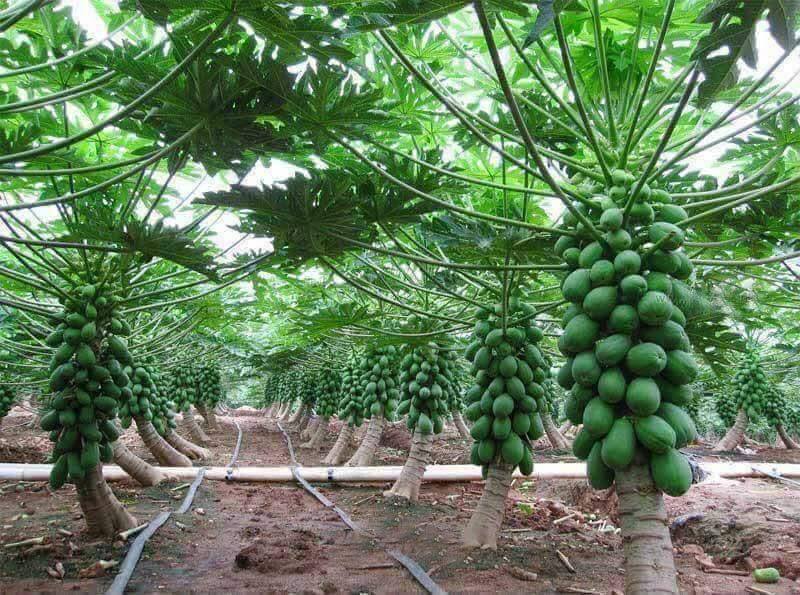
Pawpaw variety that can yield 40 fruits in eight months. Photo courtesy.
Kenyan farmers can now access seeds and plant a fast maturing pawpaw variety from South Sudan. The variety takes a shorter time to mature and yields more fruits than the ones already in the market hence farmers stand good chances of earning more.
According to Joseph Wanyama, a farmer in Nairobi who went on a farming mission in the youngest African nation, the variety yields up to 40 fruits per tree and takes eight months to mature.
“I have realized that this super-yielding pawpaw variety which is currently popular in South Sudan can earn farmers in the country who are keen to reach the markets within the shortest time possible with more fruits for income,” said Wanyama.
He has returned with a handful of seeds, which he distributed to some farmers free of charge and although the stock has since run out, he is promising to ensure that the variety picks up among farmers in the country.
“I recommend that farmers who are keen on cultivating the high-yielding variety contact his colleague, Mr. Tony Ochieng, whom he says has hundreds of seedlings for sale.”
Mr. Ochieng sells the seedlings at Sh80 a piece and he can be reached through phone number 0710876547 or email This email address is being protected from spambots. You need JavaScript enabled to view it..
Pawpaw which can earn farmers steady income all-year-round has a wide variety of usage such as salads, refreshing drinks, jam, jelly, marmalade, candies and crystallized fruits. Green fruits are pickled or cooked as a vegetable too.
RELATED ARTICLE: Pawpaw farmers to earn Sh3.2 million with a new hybrid variety
Planting
According to Oxfarm Organic, a company that deals with selling of seedlings of all types of fruit trees, pawpaw is propagated by seed. To reproduce the desired characteristics it is best to get seeds through controlled pollination. Use of sterilized soil minimizes losses resulting from nematodes and damping-off fungi. Germination takes 2-3 weeks.
Another practice is to sow the seeds in sterilized nursery beds and to prick out at the 2-3-leaf stage, transferring 3-4 seedlings to each container. Seedlings are transplanted about 2 months after sowing when they reach the 3-4-leaf stage or 20 cm height, preferably at the onset of the rainy season.
During transplanting, take care not to disturb the roots. Older seedlings recover poorly after planting out. Papaya needs adequate drainage and is often planted on mounds or ridges. Transplants must be watered regularly until they are established. Field spacing are in the order of 3 x 2 m to 2.50 x 1.60 m, giving densities of 1667 and 2500 plants/ha respectively.
RELATED ARTICLE: Irrigation keeps pawpaws producing
Thinning to one female or one hermaphrodite plant per hill is done when the plants reach the flowering stage. In the absence of hermaphrodite plants, 1 male plant per 25 – 100 female plants is retained as pollinator.
Papaya plants grown from seed produce fruits of different shapes, sizes, colour and even taste. Vegetative propagation of papaya provides a solution to most of these problems. The clone is selected for higher productivity and good quality fruits besides agronomic qualities such as dwarfness for easy harvesting and good resistance to diseases.
RELATED ARTICLE: Makueni farmer adopts bottle drip irrigation for his pawpaws
Market
Currently a large box weighing 54 kilogran retails at Sh2,200 in Nairobi, Sh1,200 in Kisumu, Sh1,620 in Eldoret and Sh2,000 and Sh2,160 in Nakuru and Malindi respectively.
For the pawpaw seeds contact Mr. Tony Ochieng' on 0710876547 or email This email address is being protected from spambots. You need JavaScript enabled to view it.
















Comments powered by CComment